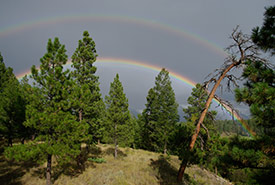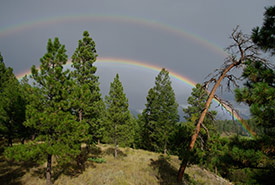NCC: Land Lines – Queer connection and representation in conservation: NCC’s Pride/2SLGBTQIA+ Resource Group

Double rainbow over Cherry Meadows, BC (Photo by Walter Latter)
Since I was about 13 years old, I’ve known I was queer, and I’ve also known that I love the environment and wanted to make conservation my life’s work. Yet, my connections to the queer community and to the conservation community have often been separated. I have my 2SLGBTQIA+ friends and family, who think it’s cool that I like nature so much. And I have my conservation friends and colleagues, who often don’t know that I’m queer.
As a queer cis-woman in a long-term relationship with a cis-man, I sometimes “pass” as straight in conservation circles. I don’t lie, but I also don’t speak openly unless I’m extremely comfortable with the individual I’m speaking with. It can be exhausting and isolating. However, my ability to “pass,” as complicated as that privilege feels to me, has given me a level of safety in some spaces where others with different identities than mine may not have that same experience.
For much of my 14-year career in conservation, this “don’t ask, don’t tell” approach has felt like a necessary evil. Sometimes it feels necessary for my physical safety, especially in remote field locations or places that aren’t known for being 2SLGBTQIA+ inclusive. Field work can sometimes have a very “macho” culture, which isn’t always welcoming to marginalized groups, including women, 2SLGBTQIA+ and BIPOC folks. Many years ago, in a previous conservation job, where I was out to colleagues, my girlfriend at the time and I were threatened and harassed while doing field work. I’ve also seen several gay male colleagues in conservation who were subjected to discrimination and concerned for their physical safety, especially in remote settings.
Frequently, passing has also been necessary for my psychological safety: to get through the day without feeling othered, suspicious that I’ll be subtly discriminated against or written off, or so I can brush off microaggressions and trans/homophobic comments by thinking, “well, they didn’t know they were talking about me.” Like I said, it can be complicated, exhausting and isolating.
While thankfully, I’ve seen a lot of these sorts of things get better over the years, it’s often still a reality for 2SLGBTQIA+ folks generally and comes with some specific considerations for people who do ecology and conservation work.
When I talk with other 2SLGBTQIA+ people in conservation though, there’s an instant bond, and a huge feeling of relief. Like setting down a giant weight that I didn’t even realize I’d been carrying around. A few years ago, after struggling with some upsetting experiences, I came out to a couple of colleagues at the Nature Conservancy of Canada (NCC), where I work as conservation biology coordinator, who I felt would be supportive. To my surprise, several of them also identified as 2SLGBTQIA+! Several shared similar experiences and it made me think about how to help evolve the culture for the future, especially for 2SLGBTQIA+ youths entering conservation to feel safe, supported and valued.
I think the answer, at least in part, involves connection and representation.
In 2021, several NCC staff self-organized a Pride/2SLGBTQIA+ Employee Resource Group. The Great Places to Work Organization (Global Authority on Workplace Culture | Great Place To Work® Canada) describes employee resource groups as “voluntary, employee-led groups whose aim is to foster a diverse, inclusive workplace aligned with the organizations they serve.”
The Pride group meets once a month in a safe and positive virtual space to connect. Sometimes this includes just chatting about what’s going on in our lives, while knowing we’re in a safe space. Other times it involves working on ways NCC can foster inclusivity, and incorporate fun and educational activities related to supporting the 2SLGBTQ+ community. Not only for Pride month in June every year, but year-round to support colleagues, partners, donors and volunteers of all gender identities and sexual orientations.
The Pride/2SLGBTQ+ employee group has been an incredible way for staff to connect, have a sense of community within the organization, and see ourselves represented in various roles across Canada — from conservation and GIS, to communications, fundraising, operations and finance. Suddenly, it feels like these two communities aren’t really that separate! I can’t begin to describe how meaningful a group like this would have been to me earlier on in my conservation career, especially when going through difficult times, and I’m so happy to see this connection being facilitated for community members now. Seeing NCC support and celebrate the group’s creation, seek its input on relevant issues, as well as create an EDI advisory committee and release an EDI Commitment Statement has also meant the organization itself feels more genuinely inclusive and supportive.
Queer connection and representation in conservation fills me with so much hope for the future: for 2SLGBTQIA+ conservationists and nature lovers, especially youth, to feel like they belong in this space, and for the larger conservation community to embrace the amazing diversity, unique perspectives and fabulous energy we bring.




